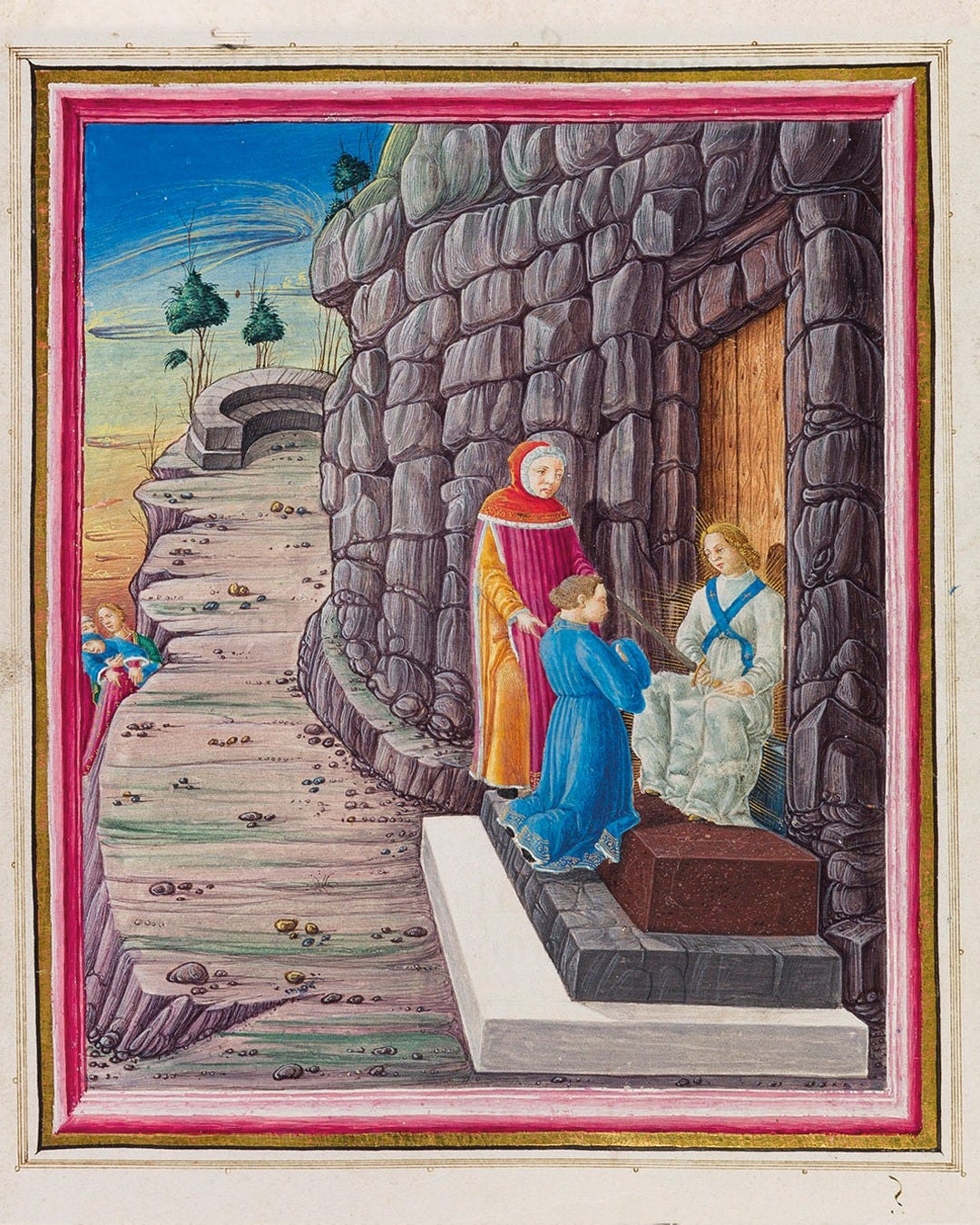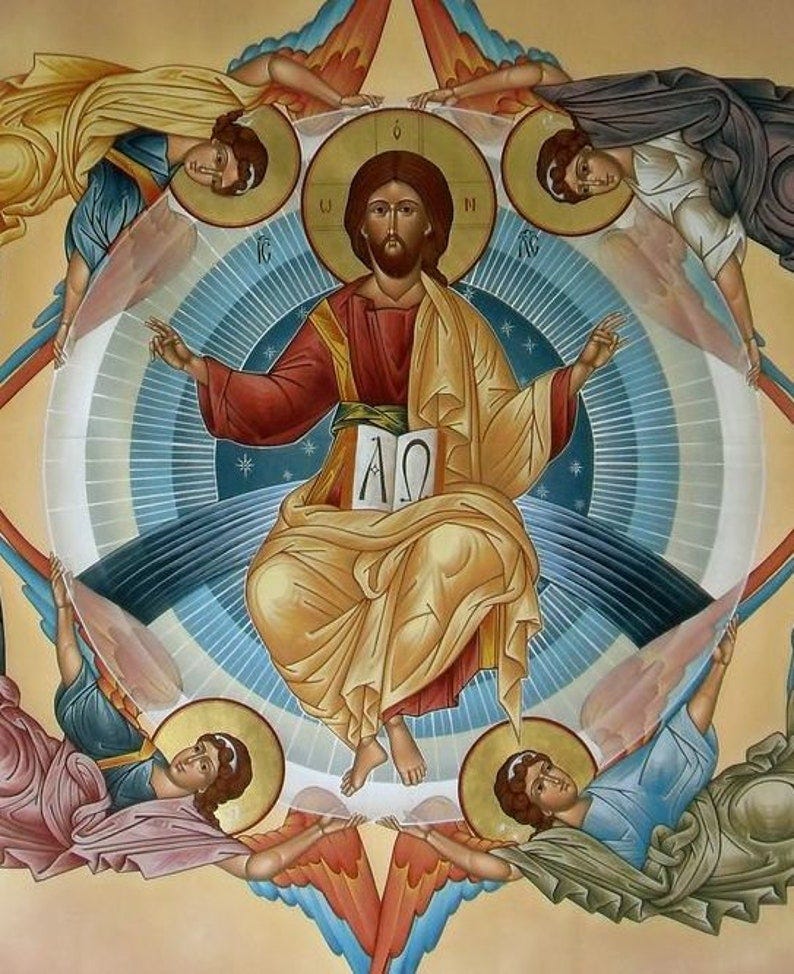Lately I’ve been working on an online class offered by Hillsdale1 detailing Dante Alighieri’s Divine Comedy. It is a masterpiece of a classic novel, and taught brilliantly by Dr. Stephen Smith.
One particular theme throughout listening to the lectures and reading significant passages of the book has been that of purifying desire.
I’m not one to compliment—or acquiesce to—culture, and I don’t think you’ll find me starting now.
The Western world has so perverted or turned inside out, the will (or loves) of man. It has not in and of itself done this deed, but has worked alongside Sin and the devils of Hell to transform man’s desire for glory in Paradise to be turned inward and down. I can see this in my own life through true desire being twisted by folly.

Contrast to the Seven Deadly Sins are the Virtues, which Dante provides insight into for us when we read Purgatorio, the second part of the Pilgrim’s journey in The Divine Comedy. Uncovering the wealth of biblical wisdom that The Comedy is founded on led me to uncover something else: corrupt desire that must be refined through fire and beauty.
Misaligned desires during this earthly life must also be retrained during this earthly life. Secondary loves become primary loves in a world a heart desiring God is not only regarded as foolish but self-deprecating rather than renewing and healing. Of course, the secular world’s view of God falls utterly short of the entirety of the biblical view of God which is actualy explored through the confessions and stories of victims living in Dante’s Inferno. The post-Christian culture cannot be allowed to define the Christian’s experience or knowledge of Yahweh.
Something really fascinating that I have learned through reading various Scriptures on desire and human needs has been that these desires are part of our completion as fully human.
Desire itself is right, part of who we are born to be. The issue is when we do not choose freely to love what is right, to love enough, and not too much.
Unpacking this a bit more, I began to realize experientially and intellectually that the Creator God built us to desire, to long for—indeed to ache for—love, connection, beauty, art, wisdom, growth, vision, and yes, even glory. The Bible as a whole, and specifically in Genesis and Revelation, the bookends of it’s entirety, speak to our purpose on earth, the journey of pilgrimage, being to attain our fullest humanity. To don the attire of a person that is whole in character and personality would be our greatest desire and mission in the mortal life.
Dante knows this full well when he reveals this freeing truth on the steps up to Mt. Purgatorio’s gate. There is a passage here that discusses the only way up through Purgatorio is intense and singleminded desire,
"That mountain cranny we climbed up, my guide and I behind him, all alone, after the band had left us. . . . Fly, I say, with the feathers, light and fleet, of great desire, behind a guide who gave me hope, and held a lamp unto my feet."
In the Inferno, Dante is warned through various meetings with souls who’s loves went astray, leading the reader to perhaps think that love and desire are out of line with somebody who seeks healing, restoration, and above all, God.
However Dante is told that he must ardently long to be refined, start afresh, and frankly, long for the fulfillment of his desires. Purgatorio is not itself the fulfillment of desire, yet it is the way Dante must undergo if he is ever to learn to love love in a way that is divinely whole.
Inwardly, I have struggled with passages that speak of an “all or nothing mindset” toward a relationship with Christ. Being of a personality that desires clarity, for things to make sense, there seemed to be this great heinous gap between my humanity and the glory of a divine, majestic, lovely God. That ‘gap’ was my desire for beauty, love, human connection, and much more.
Through the teaching of an Anglican priest who’s church I just ‘stumbled’ upon, a few misconstrued sentences of St. Paul, Dante Alighieri, and most notably the Holy Spirit, my supernaturally human desires have become ordered and fallen into line within myself.
There’s something about being human that is supernatural too—it’s a miracle when we draw breath every minute, when babies are born, when we find love, when we are proud of a work of art. Everything we do is nothing short of a miracle because it would not have happened without the greatest miracle of all: the life-giving spirit of God indwelling mankind in the beginning. The desire we dream will come true are miraculous.
So, the supposed ‘gap’ did not exist in reality at all, but only in my mind.
“A peace that surpasses understanding”, stands at the gate of the human heart when desire is not cast out nor abandoned or repressed but acknowledged, cared for, and goverened intentionally.
Desire and love used interchangeably, can either become the bane or the greatest hope that we are tasked with nurturing and looking after.
"Not the Creator nor a single creature, as you know, ever existed without love, the soul's love or the love that comes by nature. The natural love is just and cannot rove. The soul's love strays if it desires what's wrong or loves with too much strength, or not enough. When toward its prime good it is led aright and keeps good measure in the second goods, it cannot be the cause of bad delight. But when it twists to evil, or does not race for a good with the appropriate care, the Potter finds rebellion in the pot. Hence you can understand how love must be the seedbed where all virtuous deeds must grow, with every act that warrants punishment."
This quote is from the discourse on love given to Dante by Virgil, his mentor and guide through Inferno and Purgatorio.
When desire is put aright within the soul, there is naturally an outpouring of love channeled purposefully toward the right objects, in a dose strong enough and yet not too weak either.
There is a smile behind the Father’s eyes when he watches us delight in the created order inside ourselves and also without. Take thest two examples:
A man looking through a telescope that illuminates the stars of the universe feels wonder and awe rise within his being. He feels immeasurably small compared to the galaxies upon galaxies that orbit the tiny globe he lives on, which in turn compared to him is quite large.
Or again, a mother who feels love rise up in her as she watches her child attempt something difficult. She is proud of her child who is growing in who they are as an individual.
Both of these mundane human experiences have something else underlying them: desire.
In the first instance, there is desire for beauty. Beauty uncontained, beauty outside the simplistic human realm (which isn’t really simplistic at all). Beauty is needed, in all seasons of existence no matter who you are or where you live.
In the other, a desire for her child, the parent/child bond which was born in her as she bore her child for months and held that child in her arms; a natural connection established that is necessary for the child’s wellbeing and development.
Desire is the hope that we are given when the seas look rough. Hope placed in a Person who is known to come through, to uphold and establish, will never disappoint. Desire is hope because desires looking toward a future glory will never be put to shame.
Ultimately, all of the desires we experience and play temporary house to are directing us toward Mt. Paradiso, which is where all of our loves are completed and fulfilled.
Dante knew this, and so does Jesus.
American religion tell people that in order to achieve hapiness, we ought to live like gluttons, whether that be gluttons for sex, money, power, food, or any other idol out there.
Eastern religions tell people in order to achieve hapiness we must empty ourselves of everything that is not purely of the spiritual realm above.
Christianity offers a less black and white take on desire, nontheless much more practical and, relievingly, achievable!
“Most assuredly, I say to you, whatever you ask the Father in My name He will give you.” (Jn. 16v23)
Perhaps this idea of desire which I’ve mused upon was some of what Jesus meant when he talked about a future where tears are turned to laughter and where he quotes the above verse. It’s not about a magic word that we pray to God in order to get whatever we desire in the moment.
No.
I think He means something more along the lines of a heart’s desire that is purified through the purgatory that is this life, in offering a supplication in the name of Christ, will receive in full measure the reward of their purification. Not by any merit of their own but because we are born to desire and whether on earth or in Paradise, our desire will be completed.
Indeed, if any of us knew the gravity of invoking the name of God whether by prayer or any other means, I don’t think would we dare to request anything from Him that was not seriously thought upon beforehand and also crucial to our completion as human beings.
The loves we hold to so dearly in this life must be reordered, shifted all about so that they may be cared for and seen to properly. We must be taught to love the right things, in the right amount, and encourage the loves that seem to be failing.
Love and desire are perhaps not so black and white, but they are a treasure and a stewardship, and that ought to be a comfort when the devils of the world try to make you believe in crazy farfetched theories like repressing them by some religious legalism or by giving into them utterly, becoming a twisted monster of a human with no regard for God, others, or the care of self.2
Orderly love is love that is Divine.
Desires purified are ones we can uphold.
Anything less, and He will not be satisfied with the results.
But He knows the way that I take; When He has tested me, I shall come forth as gold. - Job 23v10
For another resource similar to this topic but honing in on free will and love, read this beautiful article: https://digitaldante.columbia.edu/dante/divine-comedy/purgatorio/purgatorio-18/





